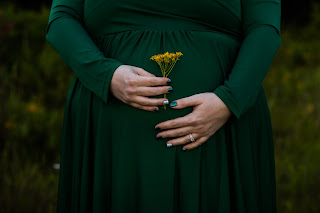The following comes from BoneWoman Outsider Art. Something is lost here by not having the two images below next to one another, but I think that the text and the juxtaposition of the images carries a well-constructed story of memories, love, loss, and development. I say "well-constructed" because this can be construction site-raw and hit like bricks. There is something blue-collar here and there is something that takes up our own construction of memories and loss and what we do with them. Intended or not, all of this poses questions for me of how to define art and how art carries time and life along.
Today, I painted a picture of my mama, today is the day she died. Lots of tears mixed with paint, I never stop missing her!1972 - Riding in the front passenger seat in our yellow dodge dart sitting by my mama in her green lime checker polyester dress she made herself a white scarf tied around her head hiding the baldness underneath - chemo colon cancer she is dying rotting on the inside - I am the last born of eight children - 15 - it was a rare moment to ever have my mama to myself - it is cold the heat is blasting in the car it smells old and moldy we arrive to the shopping center - Piggly Wiggly - a sign with a pig wearing a white hat and apron a stripe red & white shirt smiling at us welcoming us to come on in but we do not we walk behind the store where a small record store is located - it is tiny barely five people can fit into the store - my mama had asked me what I wanted for my birthday - my mama had never asked me ever what I wanted for my birthday - I said I want the single of Roberta Flack the first time I have saw your face - we went into the store and there it was a black and red 45 vinyl slipped inside a plain white cover. Next to the single was the 33 - the full album First Take - A bright yellow album cover with Roberta seating on a piano stool her hands posed over the white keys looks like she playing in a smokey bar with her musicians to the side two orange lamps over her head she is wearing a black and white dress with a white scarf that looks like the one my mama has on her bald head. Roberta head is bowed as if she is praying to the piano. I so wanted the whole album but I will not ask because I know we cannot afford it.
We return to the car, it is cold, the wind chills my bones, I am holding on to this little white package for fear the wind will take it from me - we return home I run to my bedroom the one I share with my sister Dea - bunk beds I pull out our little record player from underneath the bed - looks like a red and white small suitcase. I flip the brass clasps - fling open the record player and gently place my 45 on the turntable lifting the needle and carefully carefully placing the needle on the record so as not to scratch this precious early birthday gift. Roberta comes to life her voice in my room all mine for that moment she sings
The first time ever I saw your face
I thought the sun rose in your eyes
And the moon and the stars were the gifts you gave
To the dark and the endless skies, my love
To the dark and the endless skies
And the first time ever I kissed your mouth
I felt the earth move in my hand
Like the trembling heart of a captive bird
That was there at my command, my love
That was there at my command, my love
And the first time ever I lay with you
I felt your heart so close to mine
And I knew our joy would fill the earth
And last 'til the end of time my love
And it would last 'til the end of time
The first time ever I saw your face
Your face, your face, your face
Mama is in the room next to mine, I can hear her grunting, pulling off the tight dingy white girdle, slipping out of her green polyester dress, the bra and then I hear the bed springs squeak and she is lying down in her bed.
Soon it will be time for me to go in and change the bandage that covers the oozing wound on her belly, where they removed a tumor the size of a grapefruit. She lays there and we both are listening to Roberta sing “The First time I saw your face" coming from my room. I cannot look at my mama because I know I will cry and we did not cry in front of each other in my house. All tears were hidden. Mama died two months later - January 17th -1973 Roberta Flack won a grammy award two months later 1973 for The First time I ever saw your face.






























